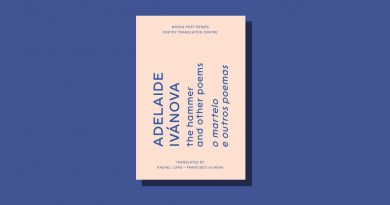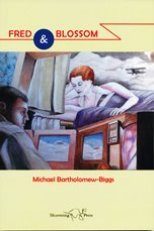‘March and After’ by Jon Mitchell
-Reviewed by Afric McGlinchey–
In the wake of Japan’s most powerful earthquake since records began, Welsh poet Jon Mitchell batters out poems on his typewriter. Classified as unsuitable to be a volunteer in the devastated aftermath, this is all he can offer his adopted country. So here we have brief, scattershot images of the gargantuan, mind-bending tasks facing the survivors.
These simple, fleeting and affecting cameos also trace the moment-by-moment experiences and emotions of a helpless onlooker.
Considering the complexity of a disaster that includes not only a series of earthquakes but over 900 after-tremors, a tsunami that in minutes was carrying houses, buildings, boats and vehicles away, fires that blazed for kilometres, and radiation leakage from a nuclear power station, Mitchell’s observations are understated and wry, often self-mocking.
The opening poem, ‘twenty five tremors’ races along like a rapid heartbeat during the countdown to the next tremor:
‘I don’t know
what’s worse
the earthquakes themselves
or the early-warning bells
on the tv news
that have me
on my pavlov’s paws
in 5
and 4
and 3
and here we
go again’
In another poem, a woman who has had chemotherapy for cancer and reacts with bravado:
‘fukushima can blow
sky high/for all I care
I’m radiation-proof
I read it online’
Written with the momentum of an underground press, there is a sense of speed and urgency in the lack of regular punctuation, lowercase letters, short, terse lines that convey the immediacy of gut-reaction to a shocking event. We are in these moments with him:
‘a shoe wedged
in the door
to keep it
open when the roof
caves in the walls
still swaying
a tipped stack of books
my bathroom mirror cracked –’
Mitchell scrambles for time, as hours, even minutes are suddenly precious. The thought of years hence is a luxurious fantasy.
In the poem titled: ‘2.46’, in the throes of an earthquake, he chats up a ‘pretty suited office lady’ he has just witnessed pocketing a lipstick and chocolate:
‘on the jellyroll ground
– a pop-song long –
I sidled
step-footed apologized and introduced
myself’
These are not only snapshots of a catastrophe, they are a personal narrative. The need for human contact is always present, of course, and paramount when there are possibly only moments to live. The woman’s observed ‘crime’ gives him his cheesy chat-up line (revealed in a later poem): ‘they shoot looters / you know’. This is the beginning of a bitter-sweet disaster-zone relationship.
The details included in these poems are often the incidentals those not sharing the experience might not consider. For instance, three million commuters walk home after the earthquake, and the shops are sold out of cigarettes, sneakers, bicycles. Mitchell shops for rubber bands, kitchen towels, sea salt, feeling like ‘hilda bloggs’s husband’ as the word ‘irradiated’ appears on the news. This reference to an animated movie brings home the fact that, for Japan, the catastrophic future has arrived. A scattering of references such as this one give the poems a universality and in some cases, contemporary relevance.
The key appeal of this chapbook is its humanity – before I had got to page twelve, I had laughed four times, and had welled up too. After the initial pandemonium, the community rallies to counterbalance the terror and sense of helplessness.
In ‘a tweet from ultraman’, ‘things must be getting to me /I know /when a tweet from ultraman /makes me cry like a baby’. Mitchell is inspired to follow the tweeter in signing up as a rescue and salvage volunteer, but discovers to his dismay that he is ‘too old to shovel’, ‘too short to heave boxes and …can’t even drive.’ So, instead, he offers his services as a writer and records his observations of ‘the unslept man’, of ‘stable ground’, ‘a top-turned taxi’, of the girl who wraps her poodle’s ‘turd as carefully /as a slice of wedding cake’ amidst mud, rolled cars and smashed homes, while the soldiers watching ‘burst /into such stomach-creasing laughter /that it all begins /to hurt’.
Mitchell captures the quirky and the surreal in these collages, so that although we are observing tragedy, it is also a heart-warming testimony to the resilience of humanity.
There are those who flee, considered by those who remain to be rats leaving the sinking ship. One of my favourite poems is the heartfelt ‘a week on’, where, surprised that Mitchell hasn’t ‘jumped ship too’, his Japanese neighbours of eight years invite him in for sake and snacks, and
‘- in the rattle of an aftershock
and a mouthful of ham –
I finally found out
the names of those next door
and
the nicknames they have for me
and perhaps what it means to be
home.’
In a spare, deceptively simple style reminiscent of Raymond Carver, this slim chapbook plays out the universal and poignant story of survival, endurance and redemption. Of human contact. And it will make you laugh. What more could you ask.
March and After is published by Printed Matter Press, all sales go to Peace Boat operations in Tohoku. It is available as a limited edition pamphlet or as a limitless ebook.





I feel a bit guilty talking about (capital P) Poetry when the event this book/novella/collection describes were so densely catastrophic to so many people…. but…. but… but…
The power of this work is that it manages to describe those chainlinked moments on so many levels that you actually feel fiercely engaged, and a sort of immediacy that’s emphasised and stressed by the flashes of humour, and builds with each slice of narrative. And, yeah, I laughed out loud too. And, ditto, the writer twisted his pen and I found a lump stuck in my throat and that my chest was tightening. Brilliantly done. The Carver comparison is well earned. Brilliant.
(I got the kindled version, but all the monies still go to relief work in the affected areas – and that helps the guilt a little.)